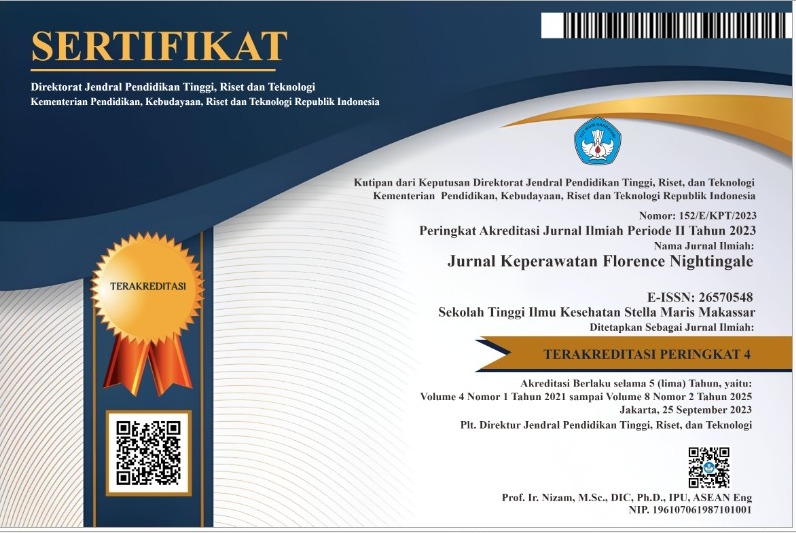Factors Affecting the Academic Performance of Nursing Diploma Student
Keywords:
Academic Achievement, Nursing Student, Nursing DiplomaAbstract
Achievement can be a gateway to achieving higher education, a career, or job opportunities. Students’ exam scores that do not meet the university's minimum limit affect academic achievement results. This study aimed to identify which factors most significantly influence nursing students’ academic achievement. This study used a cross-sectional design, with 158 samples selected from second- and third-year diploma nursing students. A modified survey questionnaire was distributed online to collect data. Data analysis was performed using descriptive statistics and simple and multiple linear regressions. The results showed that teacher factors were the most influential on academic achievement compared to 3 other factors such as student-related factors, home-related factors, and school-related factors, with a t-value of 3.274 (β = 0.301, p = 0.001, R² = 0.27). This study concludes that teacher factors have the greatest influence on learning achievement. Suggestions for students are to be proactive, build independent learning strategies, and optimally utilize campus facilities.
Downloads
References
Adediwura, A. A., & Tayo, B. (2007). Perception of teachers knowledge, attitude and teaching skills as predictor of academic performance in Nigerian secondary schools. Educational Research and Reviews, 2(7), 165-171.
Ali, M., & Hayat, B. (2019). Non-academic factors influencing students' achievement: a study in the Indonesian madrasahs. International Journal of Learning and Intellectual Capital, 16, 180.
Ali, S., Haider, Z., Munir, F., Khan, H., & Ahmed, A. (2013). Factors contributing to the students academic performance: A case study of Islamia University Sub-Campus. American journal of educational research, 1(8), 283-289.
Alos, S. B., Caranto, L. C., & David, J. J. T. (2015). Factors affecting the academic performance of the student nurses of BSU. International Journal of Nursing Science, 5(2), 60-65.
Alshammari, F., Saguban, R., Pasay-an, E., Altheban, A., & Al-Shammari, L. (2017). Factors affecting the academic performance of student nurses: A cross-sectional study. Journal of Nursing Education and Practice, 8(1), 60.
Bal-Taştan, S., Davoudi, S.M., Masalimova, A., Bersanov, A.S., Kurbanov, R., Boiarchuk, A., & Pavlushin, A. (2018). The impacts of teacher's efficacy and motivation on student's academic achievement in science education among secondary and high school students. Eurasia journal of mathematics, science and technology education, 14, 2353-2366.
Barry, A. (2019). Gender Differences in Academic Achievement in Saudi Arabia: A Wake-Up Call to Educational Leaders. International Journal of Education Policy and Leadership, 15(15).
Berkowitz, R., Moore, H., Astor, R. A., Benbenishty, R. (2017). A research synthesis of the associations between socioeconomic background, inequality, school climate, and academic achievement. Review of Educational Research, 87, 425–469.
Cai, J. (2018). Effects of Home Resources and School Environment on Eighth-Grade Mathematics Achievement in Taiwan. ArXiv, abs/1801.06049.
Carvalho, R. G. G. (2016). Gender differences in academic achievement: The mediating role of personality. Personality and Individual Differences, 94, 54-58.
Considine, G., & Zappalà, G. (2002, April). Factors influencing the educational performance of students from disadvantaged backgrounds. In Competing visions: Refereed proceedings of the national social policy conference (Vol. 2001, pp. 91-107).
Fajar, S., Hussain, M., Sarwar, H., Afzal, M., & Gilani, S. A. (2019). Factors affecting academic performance of undergraduate nursing students. International Journal of Social Sciences and Management, 6(1), 7-16.
Fang, L., Sun, R. C., & Yuen, M. (2016). Acculturation, economic stress, social relationships and school satisfaction among migrant children in urban China. Journal of Happiness Studies, 17(2), 507-531.
Isik, U., Wouters, A., Ter Wee, M. M., Croiset, G., & Kusurkar, R. A. (2017). Motivation and academic performance of medical students from ethnic minorities and majority: a comparative study. BMC medical education, 17(1), 233.
Kim, L. E., Jörg, V., & Klassen, R. M. (2019). A meta-analysis of the effects of teacher personality on teacher effectiveness and burnout.
Korir, W. (2017). Influence of number of siblings and learning resources at home on students’ academic performance. Journal of Emerging Trends in Educational Research and Policy Studies, 8(6), 291-299.
Maria, K., & Awan, A. G. (2019). Impact Of Sociocultural Factors On Academic Performance Of Students In District Multan, Pakistan. Global Journal of Management, Social Sciences and Humanities, 5(3), 425-452.
Merolla, D. M. (2017). Self-efficacy and academic achievement: The role of neighborhood cultural context. Sociological Perspectives, 60(2), 378-393.
Moore, P. J. (2019). Academic achievement.
Orsini, C., Binnie, V. I., & Wilson, S. L. (2016). Determinants and outcomes of motivation in health professions education: a systematic review based on self-determination theory. Journal of Educational Evaluation for Health Professions, 13.
Raychaudhuri, A., Debnath, M., Sen, S., & Majumder, B. G. (2010). Factors affecting students’ academic performance: A case study in Agartala municipal council area. Bangladesh. e-Journal of Sociology, 7(2), 34-41.
Reynolds, M. R., Scheiber, C., Hajovsky, D. B., Schwartz, B., & Kaufman, A. S. (2015). Gender differences in academic achievement: Is writing an exception to the gender similarities hypothesis?. The Journal of genetic psychology, 176(4), 211-234.
Richardson, V., & Fallona, C. (2001). Classroom management as method and manner. Journal of curriculum studies, 33(6), 705-728.
Ruiz, L. D., McMahon, S. D., & Jason, L. A. (2018). The role of neighborhood context and school climate in school‐level academic achievement. American journal of community psychology, 61(3-4), 296-309.
Schneider, B. H., Tomada, G., Normand, S., Tonci, E., & de Domini, P. (2008). Social support as a predictor of school bonding and academic motivation following the transition to Italian middle school. Journal of Social and Personal Relationships, 25(2), 287-310.
Sharma, P., Singh, P., Kalhan, S., & Garg, S. (2017). Analysis of factors affecting academic performance of MBBS students in pathology. Ann Int Med Dent Res, 3(5).
Shukla, N., Rai, K., & Kaur, D. (2016). To study the association between number of siblings and academic achievement. International Journal of Education and Management Studies, 6(2), 165.
Steinmayr, R., Heyder, A., Naumburg, C., Michels, J., & Wirthwein, L. (2018). School-Related and Individual Predictors of Subjective Well-Being and Academic Achievement. Frontiers in Psychology, 9.
Vizeshfar, F., & Torabizadeh, C. (2018). The effect of teaching based on dominant learning style on nursing students' academic achievement. Nurse education in practice, 28, 103-108
Wainer, H., & Steinberg, L. (1992). Sex differences in performance on the mathematics section of the Scholastic Aptitude Test: A bidirectional validity study. Harvard Educational Review, 62(3), 323-337.
Wang, M. T., Degol, J. L., & Amemiya, J. L. (2019). Older siblings as academic socialization agents for younger siblings: Developmental pathways across adolescence. Journal of youth and adolescence, 48(6), 1218-1233
Published
How to Cite
Issue
Section
Copyright (c) 2025 Ayu Prameswari Kusuma Astuti, Iis Aisyah (Author)

This work is licensed under a Creative Commons Attribution-ShareAlike 4.0 International License.









